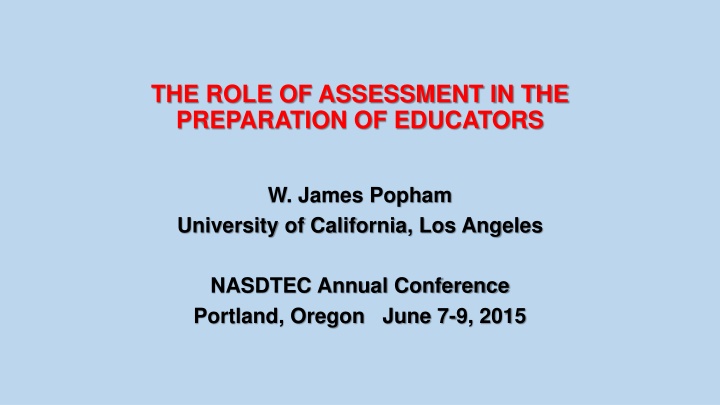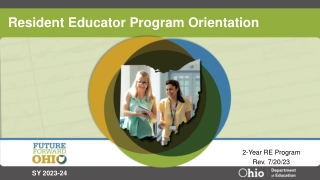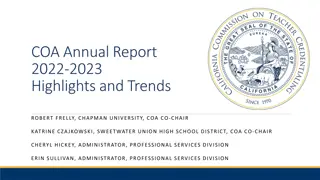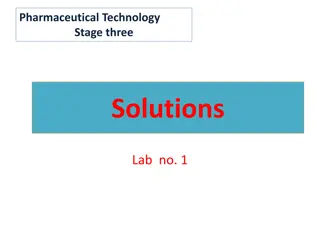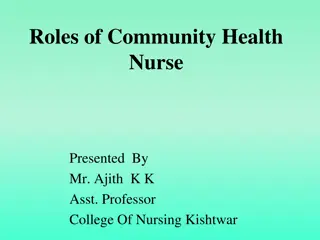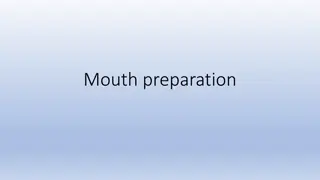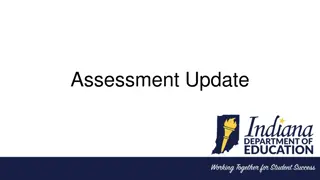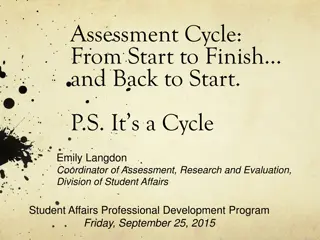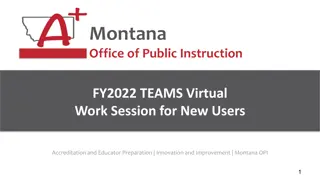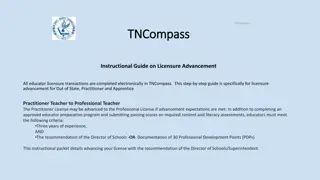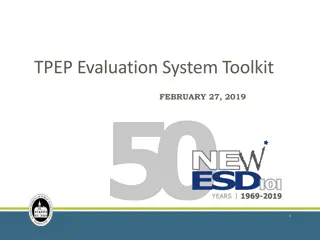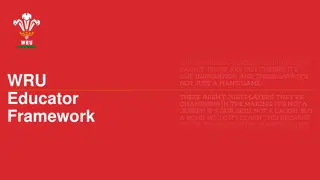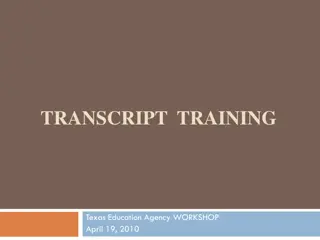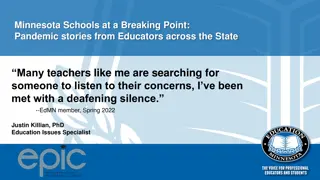The Role of Assessment in Educator Preparation: Key Issues and Solutions
Focus on assessment in preparing educators, highlighting key problems faced in assessment literacy and formative assessment. Discusses the adverse effects of assessment naivete and the importance of instructional sensitivity in educational testing.
Download Presentation

Please find below an Image/Link to download the presentation.
The content on the website is provided AS IS for your information and personal use only. It may not be sold, licensed, or shared on other websites without obtaining consent from the author.If you encounter any issues during the download, it is possible that the publisher has removed the file from their server.
You are allowed to download the files provided on this website for personal or commercial use, subject to the condition that they are used lawfully. All files are the property of their respective owners.
The content on the website is provided AS IS for your information and personal use only. It may not be sold, licensed, or shared on other websites without obtaining consent from the author.
E N D
Presentation Transcript
THE ROLE OF ASSESSMENT IN THE PREPARATION OF EDUCATORS W. James Popham University of California, Los Angeles NASDTEC Annual Conference Portland, Oregon June 7-9, 2015
FOR MORE THAN 100 YEARS THE PORTLAND, OREGON ROSE FESTIVAL
A SPEECH TEACHERS ADVICE: MESH A SPEECH WITH AUDIENCE S INTEREST AND IMPORTANCE Accordingly, because my presentation is supposed to focus on the role of assessment in the readying of new educators, I have chosen to foster your awareness of only two important assessment-related problems to me, the most important problems of all.
TWO PIVOTAL PROBLEMS FACING THOSE WHO PREPARE AND CERTIFY AMERICA S EDUCATORS 1. Assessment Literacy: American educators pervasive assessment illiteracy has permitted policymakers to adopt well-intentioned but unsound policies employing educational tests. 2. Formative Assessment: Despite overwhelming research evidence indicating that the classroom formative-assessment process can dramatically improve students learning, far too few American teachers currently use formative assessment.
PROBLEM ONE: THE ADVERSE CONSEQUENCES OF ASSESSMENT NAIVETE The source: A little knowledge and its dangers Educator s most contaminating misconception: a quick look at a century of educational testing One appalling illustration in the wrong-headed reliance on students test scores in the evaluation of teachers and schools: the use of instructionally insensitive tests
A CENTURY-LONG MISSION OF U.S. EDUCATIONAL TESTS BOTH APTITUDE AND ACHIEVEMENT: TO PROVIDE COMPARATIVE SCORE-INTERPRETATIONS
INSTRUCTIONAL SENSITIVITY DEFINED: The degree to which students performances on a test accurately reflect the quality of instruction specifically provided to promote students mastery of what is being assessed.
POTENTIAL CAUSES OF AN ITEMS INSTRUCTIONAL INSENSITIVITY Alignment Leniency Excessive Easiness Excessive Difficulty Confusion-Engendering Item Flaws Socioeconomic Status (SES) Links Academic Aptitude Links
SOCIOECONOMIC (SES) LINKS If an item gives a meaningful advantage to students from higher SES families, then the item will tend to measure what students bring to school rather than how well they are taught once they get there.
A 4th-Grade Reading Item: My father s field is computer graphics. In which of the sentences below does the word field mean the same thing as in the sentence above? A. The shortstop knew how to field his position. B. We prepared the field by plowing it. C. What field do you plan to enter when you graduate? D. The nurse examined my field of vision.
ACADEMIC APTITUDE LINKS If an item gives a meaningful advantage to students who possess greater inherited quantitative, verbal, or spatial aptitudes, then the item will tend to measure what students bring to school rather than how well they are taught once they get there.
A 4 A 4th th- -Grade Mathematics Item Grade Mathematics Item: Which of the letters below, when folded in half, will have two parts that match exactly? F (A) S (C) Z (B) B (D)
A TURN AND TALK TASK Turning to a neighbor, selecting if possible one who seems to be fairly bright, assume that this colleague is not familiar with instructional sensitivity. First, explain to your neighbor what instructional sensitivity is, and how it can reduce the accurate evaluation of educators or schools. Then please switch roles.
INCREASING THE INSTRUCTIONAL SENSITIVITY OF TESTS DESTINED FOR EVALUATIVE USES Borrowing strategies employed during recent decades in our attempts to reduce the presence of assessment bias: Judgmental bias-reduction procedures Empirical bias-reduction procedures
IN SUM: THE ASSESSMENT-LITERACY PROBLEM Because assessment-illiterate educators are, with few exceptions, currently incapable of dissuading educational policymakers from adopting unsound test-dependent policies, we must meaningfully increase American educators assessment literacy.
A POTENTIAL ALLY AROUND THE CORNER A hopefully potent national assessment literacy campaign is being undertaken by the National Assessment Governing Board and the National Center for Education Statistics aimed at three target audiences: parents, policymakers, and students. For information regarding this initiative, please watch for announcements from NCES and NAGB. (or drop me an e-mail: wpopham@ucla.edu)
PROBLEM TWO: THE UNDERUTILIZATION OF FORMATIVE ASSESSMENT Many U.S. educators do not truly understand what formative assessment is. Most American educators are unaware of the massive research evidence supporting formative assessment. Formative-assessment advocacy is far too weak.
WHAT IS FORMATIVE ASSESSMENT? Formative assessment is a planned process in which assessment-elicited evidence of students status is used by teachers to adjust their ongoing instructional procedures or by students to adjust their current learning-tactics.
FORMATIVE ASSESSMENT: WHAT IT IS NOT It is not a test. It is not an interim test (also referred to as a benchmark or periodic test) administered every few months by schools or districts. It is not the unplanned, serendipitous use of student cues to adjust teaching.
A Planned Process to Base Adjustment Decisions on Assessment Evidence FORMATIVE ASSESSMENT =
AN ILLUSTRATIVE LEARNING PROGRESSION Target Curriculum Aim Q Enabling Knowledge X Enabling Knowledge Y Subskill Z
WHY DOES FORMATIVE ASSESSMENT WORK? Because it is the incarnation of an ends-means approach to problem solving that has served humankind well ever since our plucky species arrived on earth.
A TURN AND TALK TASK Turning again to a neighbor, either the same one or, if you prefer, a more able one, please assume that the chosen neighbor is a layperson who knows naught about the nature of formative assessment. Explain to your colleague what the formative-assessment process is. Then, please, switch the explainer and the explained-to roles.
SUPPORTIVE EMPIRICAL EVIDENCE In a research review based on 250 empirical studies of classroom assessment that had been drawn from more than 680 published investigations, Paul Black and Dylan Wiliam concluded: The research reported here shows conclusively that formative assessment does improve learning. (Assessment in Education, 1998)
SUPPORTIVE EMPIRICAL EVIDENCE Other Quotes from the B&W Review: The student gains in learning triggered by formative assessment were amongst the largest ever reported for educational interventions. Significant gains can be achieved by many different routes, and initiatives here are not likely to fail through neglect of delicate and subtle features.
A DOUBLE-DOWN CLINCHER Five reviews of the research in this area synthesized a total of more than 4,000 research studies undertaken during the last 40 years. The conclusion was clear: When implemented well, formative assessment can effectively double the speed of student learning. (Wiliam, Educational Leadership, 2007- 2008)
IN SUM: THE FORMATIVE-ASSESSMENT PROBLEM Despite scads of research evidence attesting to the substantial effectiveness of the formative- assessment process in improving students learning, too few American teachers are using it in their classrooms and too few American school leaders are endorsing its use with sufficient verve.
HOW NASDTEC MEMBERS CAN SOLVE BOTH PROBLEMS: A RECOMMENDATION Require the preparation of educators either to complete decision-relevant educational assessment coursework or to demonstrate decision-relevant assessment knowledge on a certification exam. Ideally, a whole educational assessment course would be needed, but a half-course would do. The content of the coursework or certification testing should be focused on practical, instruction- relevant decisions, not traditional psychometrics.
WHEN REGARDING THE PREVIOUS RECOMMENDATION: In view of the presenter s royal lineage, you should regard this recommendation less as a suggestion, and more as: A COMMAND! The Prince s e-mail: wpopham@ucla.edu
